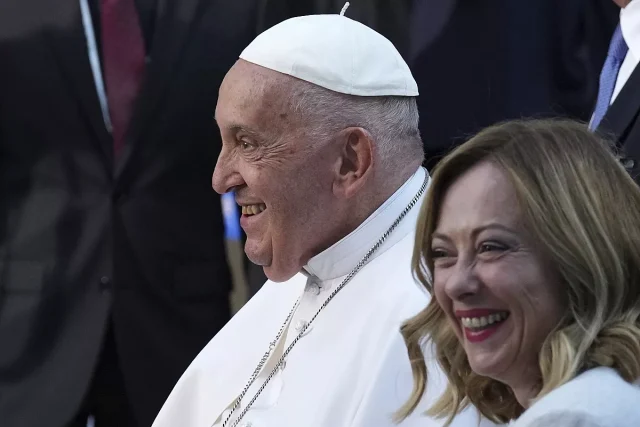
From 13 to 15 June 2024, the political leaders of the seven most wealthy nations in the world, as assessed by the International Monetary Fund (Canada, France, Germany, Italy, Japan, and the United States of America), plus the European Union as a “non-enumerated member”, represented by the President of the European Commission and the President of the Council of the European Union, Mrs. Ursula von der Leyen and Mr. Charles Michel, respectively, held their 50th summit in Borgo Egnazia, Fasano, Apulia (Italy).
The Group of Seven (G7) host representative, Mrs. Giorgia Meloni, Prime Minister of Italy (or, more accurately, President of its Council of Ministers), also invited different international authorities from a number of States taking part in this joint intergovernmental work around supposed shared values, including democratic principles, free societies, universal human rights, social progress, respect for multilateralism and the rule of law, provision of opportunities, pursuit of shared prosperity, the strengthening of international rules and norms for the benefit of all, and the safeguarding of international peace and security.
In particular, the non-G7 attending nations were Algeria, Argentina, Brazil, India, Jordan, Kenya, Mauritania, Tunisia, Turkey, and the United Arab Emirates; the degree to which some of them respectively adhere to the mentioned values could clearly be discussed.
On the other hand, the summit communiqué proclaims to uphold the “free and open rules-based international order”. This reads as a rather ambiguous commitment. What are open rules basing a free international order? Furthermore, G7 leaders support a more effective, inclusive and equitable global governance. Centralising power globally is dangerous, particularly if such centralisation aims to be “more effective”.
The first more concrete item addressed in the meeting has been the war between Ukraine and the Russian Federation. G7 has decided to make available to President Zelensky an amount of USD 50 billion, allegedly leveraging extraordinary revenues of immobilized Russian sovereign assets for freedom and reconstruction, and to disarm and defund Russia’s military industrial complex. Again, manifold questions arise here: Leveraging is not equal to coming from; it means that G7 nations will incur in debt guaranteed by seized Russian assets, whose sovereignty has been jeopardised in order to get the funding and to negotiate the applicable interest rate. But the duty to repay the debt remains, despite the guarantee.
On the other hand, it seems premature to speak about reconstruction at this stage of the violent conflict. Thirdly, disarming Russia appears to be wishful thinking in the most pure nature. Last, defunding Russia’s military industrial complex is an implicit recognition that at least some of the G7 nations are still funding it, therefore defunding being of a prior necessity.
The second item on the meeting agenda dealt with the other ongoing war, the one taking place in Gaza. G7 supports a deal for an immediate ceasefire, the release of all hostages and a two-state solution. It also calls for a significant and sustained increase in humanitarian assistance. Once more there is a contradiction in this last request: why would there need to be an increase in humanitarian assistance, let alone significant and sustained, if a ceasefire becomes immediate?
Being G7 not only a political but also economic forum, Mrs. Meloni met the President of the African Development Bank Group, Dr. Akinwumi A. Adesina, on the sidelines of the heads of State and Government summit. Their discussion dealt with joint initiatives to support the implementation of Italy’s Mattei Plan for Africa and the Rome Process on Migration and Development agenda as agreed during the Italy-Africa Summit held in Rome at the beginning of the year.
The Plan fosters major economic and strategic partnerships with African nations and institutions, and the African Development Bank Group is the main strategic financial partner for its implementation. Dr. Adesina praised Mrs. Meloni for her leadership with the Mattei plan, expanding access to energy in Africa, supporting food security, boosting health services, expanding skills and jobs for the youth, and last but not least, stemming drivers of migration. G7 has formed a Coalition to fight against the smuggling of migrants, but no further details on such initiative have been provided.
The Italian Development financial institution, or Cassa Depositi e Prestiti (CDP), has expressed a will to catalyze up to around USD 820 million over a five-year period alongside key African and international partners, with CDP and the African Development Bank Group each proposing a total of up to USD 200 million.
Sustainable Development Goals (SDGs) came as a fourth priority. Linked to them, a reminder to the World Bank to boost its lending by USD 70 billion over the next ten years, and a call for the international community to address debt burdens were expressed. Lack of clarity reappears in this context: does addressing a debt burden mean reducing it or perhaps is that a euphemism for condonation? Being gender equality one of the SDGs, women “empowerment” is allotted at least USD 20 billion over three years, but G7 does not specify with which international financial institutions this might be implemented.
Not much beef was produced regarding climate change, pollution, and biodiversity loss, except for a general will to preserve forests and oceans, and to end plastic pollution.
Artificial Intelligence is assigned a future plan action for use at the world of work according to the International Code of Conduct. Mrs. Meloni had invited His Holiness Pope Francis to make a contribution in this matter; the Argentinian pontiff was thus the first pope to speak at a G7 summit ever.
Source of image: Euronews



 Subscribe
Subscribe